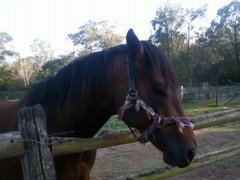It is all very well to teach aids from the saddle once you are up and riding, but how do you communicate with your horse on the ground? Before it is ready to ride; if you choose not to ride (maybe like me you only have a brood mare), etc. Well, I developed a bit of body language, as this is what horses understand best, but I also taught mine single word "commands".
When the colt was little, he used to like having the tail area of his thighs scratched. I would offer to "scratchyabum", and he would come over to me, give me his rump and I would scratch him. He really enjoyed this (the ears go floppy and the lower lip droops). The only problem was he then thought his name was "scratchyabum" and would only come for that. I had to spend some time teaching him his pet name.
But horses do respond to words if you teach them clearly what the word means. Some are obvious some are not. For example, I taught the colt the word "smell" and because he would instinctively put his nose to something to smell it, he quickly associated the word with the action I required of him. Now this might not seem obvious at first, but when you want to condition a horse to something strange, it is useful to tell him to smell it, even if he is not sure of it. Knowing he can smell it is a start toward reassurance. The colt would also try to taste many things. I never discouraged this because if he was sure it smelled okay and tasted okay, even if not edible, chances were there wasn't a monster in it and it could touch his shoulder, and then rub all over his body.
It was rather funny when I introduced him to an umbrella. Horses often rely on shape recognition, because their close up vision isn't too good. When I walked up to him with the umbrella, talking to him, he knew it was my voice but the shape was very wrong. He decided spooking was easier than waiting around to discover the monster that imitated mum's voice. But then his curiousity overtook his natural instinct to spook, so he was in the spook preparing stance half turned, and putting his nose out. Of course, I let him smell it, telling him to smell. Next he was chewing on it and wondering what the fuss was about. He wasn't too impressed when it went over his head. But then he realised the rain wasn't going on his head. Well that was it. The umbrella was cool. Everytime I went near him with one, he wanted his head under it.
Another word both horses took to quite quickly was "nana" (as in short for banana). I found this word when my two year old (then) grandson was in a trolley going through the supermarket, he pointed at things he knew were food and he would say "nana". So treats are "nana". Even her ladyship, the exracehorse, knows the word "nana".
I use "stop" and "go" in context, but because I like a word with strength, rugs became "jamas" (as in pyjamas). Neither will stand quietly for a "rug" but put on "jamas" and its okay. No tail swishing, no foot stomping. "Drink water" is self explanatory, and hey, you can lead a horse to water and make it drink. Clean fresh water.
I use a few other words. The mare is slower to learn than the colt was, because she was trained originally by other people who didn't use words particularly. She wont stop, but she will "whoa".
But, by me training them, they also trained me, and we now have a head shake/nod to indicate "come here". They use it on me and I use it on them. I respond every time, and so they in turn respond every time. It is only a courtesy. The colt used to suck in a little of his face and put his ears just a little back to indicate his displeasure, and I tried to make a similar face to him, but I am sure he would just laugh at me. (My ears don't go back).
There are other small movements they make that I take the time to read, and learn to respond to if I can, if I understand. They communicate all the time, and if you take the time to learn, you will find your own horses training you as much as you train them. Let commonsense teach you, rather than you imposing your will. You might just be surprised how well you get along with these lovely creatures. Never stop learning from them, never stop teaching them. You never know when it might get you out of a tricky situation.
There are many ways into a horse's mind and heart, these are some of my ideas ...
Saturday, June 2, 2007
Subscribe to:
Post Comments (Atom)


No comments:
Post a Comment